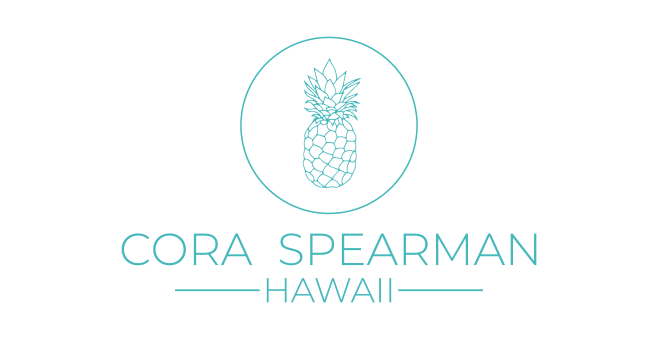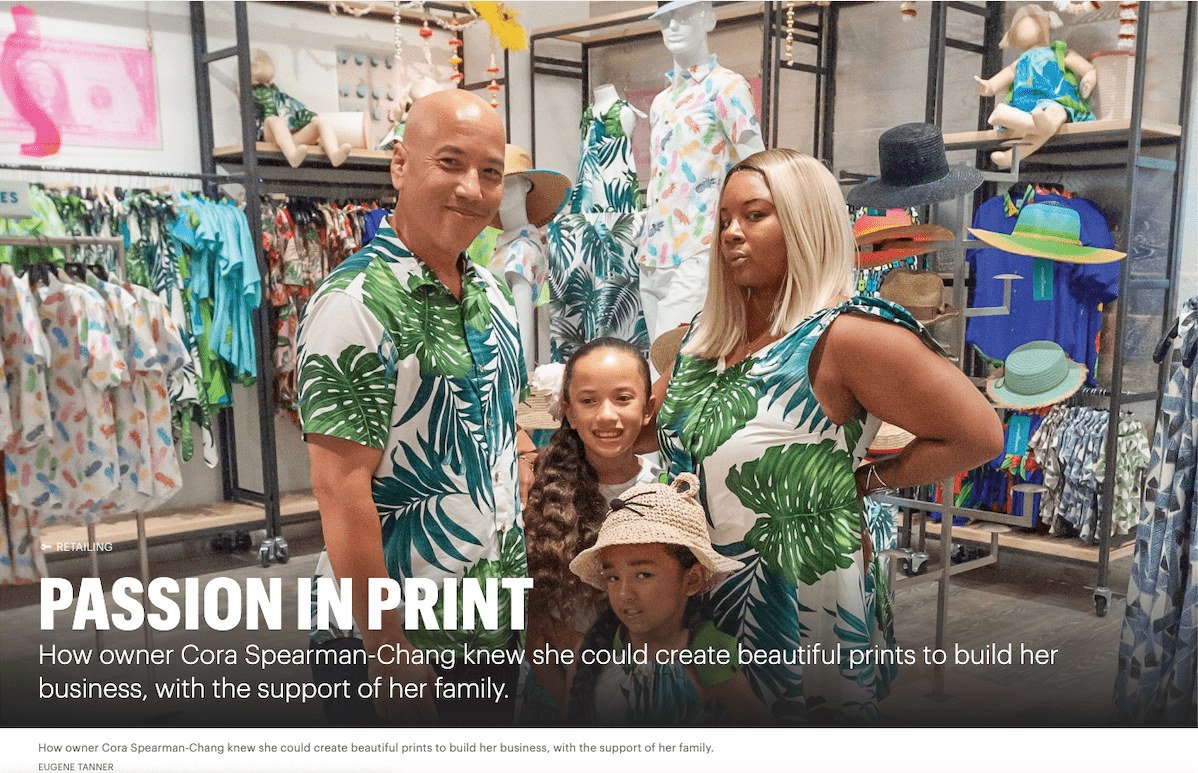This article has been reposted and formatted from Pacific Business News
Behind the seams with Coradorables
By Megan Fernandes – Reporter, Pacific Business News | Nov. 22, 2019
“Your network is your net worth.”
This has been local businesswoman Cora Spearman-Chang’s motto throughout her career as an entrepreneur. She likens her story to that of Dorothy in “The Wizard of Oz,” finding lifelong mentors along her own yellow-brick road.
Spearman-Chang’s brand of locally made and manufactured family clothing, Coradorables, now distributes internationally to stores in Osaka, Japan. The brand also just finished its limited engagement pop-up shop in Saks Fifth Avenue in Waikiki this week.
Originally from Ohio, Spearman-Chang spent time in Japan studying business. She graduated from high school in Meiko Gakuen in Fukuoka on Kyushu island and went on to double major in communications and Japanese language, history and culture at Antioch College in Ohio and graduate with a bachelors degree in international business from Waseda University in Japan.
The time she spent immersed in the Japanese culture ignited her passion for business.
“Japan is where I got into fashion; they are always ahead of the curve,” Spearman-Chang told PBN. “It’s a second home for me.”
After living in several other areas on the Mainland, such as Chicago and Washington, D.C, in 1999 she took a leap of faith and moved to Makiki with no job and no game plan. Hawaii later became the place where she would meet her husband, Chris Chang, have two children, be inspired to be a business owner and beat cancer. She has kept her ties to Japan strong, and has represented her brand at the Tokyo International Gift Show since 2013.
“I felt called here, that this was where I was supposed to be,” she said.
The success that Coradaorables has seen so far did not happen overnight and it was not without a persistent fight to defy the odds.
The Place
Before Coradorables, Spearman-Chang’s first business was The Place, a boutique specializing in products for children, pets, men and women. Spearman-Chang and her husband signed a five-year lease at Ward Warehouse on a 2,500-square-foot space that they built out and finished off with a runway down the middle of the store. Before the store opened, however, Spearman-Chang fell ill.
“That store was our dream, it was perfect,” she recalled.
In 2005, Spearman-Chang found a small, pea-sized bump inside her jaw that CT and MRI scans later showed was a lump the size of a papaya, wrapped intricately along her jaw line. She underwent a tumor resection, a 22-hour surgery, at The Queen’s Medical Center.
“We pushed the store opening back a year because of the tumor, but we were still paying on the lease through all of this,” Spearman-Chang said.
The Place opened in February 2007, selling labels like Tokidoki, Jedidiah, Maribelle chocolates and Riedel, and launched brands like Lululemon in Hawaii.
By 2009, the tumor regrew, this time more aggressively, and Spearman-Chang was forced to seek treatment on the Mainland. She went to The John’s Hopkins Hospital in Baltimore for a second 19-hour resection surgery, and stayed in the American Cancer Society’s Hope Lodge as she underwent six weeks of radiation treatment.
“They had to be just as aggressive as the cancer,” Spearman-Chang said. “Between the cost of multiple surgeries and flights back and forth to Baltimore, we went through medical bankruptcy. We had nothing and had to close the store, break the lease and donate everything.”
While in Hope Lodge battling cancer, Spearman-Chang said her optimistic nature did not falter, often telling friends and family that when she was better, she would become a kids clothing designer and once again own her own business.
“Cancer hits you on a physical, spiritual, mental and financial level,” she said. “When I was fighting for my life, none of the material things — that I worked so hard to get — mattered. I kept my faith that I would get through it.”
RELATED: The Cost of My Cancer in Hawaii By Cora Spearman / April 22, 2015
A second chance
Following a year of recovery, Spearman-Chang focused on using her second chance to build another business from the ground up.
The meaning behind the name of her new business venture came from the nickname “Coradorable” given to her by her mother. However, Spearman-Chang’s two daughters — 9-year-old Izzabelle and 6-year-old Zoe — are the brand’s true inspiration.
“When I wasn’t feeling very adorable with my [scars] and how I looked, I still knew I could create beautiful things,” Spearman-Chang said.
Spearman-Chang and her husband had no money at the time. She combined investments from angel investors, advice from her bankers at First Hawaiian Bank and extensive networking skills to build the foundation of what would become Coradorables.
According to Spearman-Chang, her longtime bankers at First Hawaiian Bank helped her through everything from opening The Place and bankruptcy, to finding resources and funding to build her new business venture.
“They helped me focus on my projections, know my numbers and to eventually scale and export,” she said.
Jeffrey Ventura, senior vice president and area manager at First Hawaiian Bank, told PBN that Coradorables and other small business owners share similar struggles.
“Many business owners that are starting up a business do not have the necessary startup capital, personal resources, or collateral, so they have a difficult time obtaining financing to get the business up and running,” Ventura said. “They may have a strong business plan and a great product, however, convincing a bank to lend them money based on projected income is not easy.”
Ventura said that in Spearman-Chang’s case, the connections she cultivated within the retail industry were vital.
“When she received the opportunity to get her clothing out there and begin to generate some revenues, we had confidence that with her determination and resiliency, she could be successful,” Ventura said. “It’s very rewarding to see someone like Cora, who has had to deal with so many challenges in her life, finally get the chance to succeed in something that she’s so passionate about.”
Curating a brand identity
The brand started strictly as kids’ alohawear and evolved from there to fill a need.
“When we had The Place, everyone asked for kid’s alohawear and we didn’t have that yet,” Chris Chang said. “There was a gap for kidswear and menswear at that time, so we evolved from a kid’s brand to a family brand.”
That need that the couple saw in Hawaii and abroad allowed them to carve a niche for Coradorables by selling “heirloom quality kids’ clothes.”
“People wanted high-end alohawear, not just the swap meet kids stuff,” she said. “That’s all I wanted to do, was create beautiful things, even if nobody bought it. It started by wanting to create that for Izzabelle, but it turns out there was a demand for it.”
The Coradorables womenswear collection quickly became a best seller both in Hawaii and in Japan, after the company entered the Asian market in 2019 — an arduous journey that began in 2017.
A series of network connections built through an audition for “Shark Tank,” and pitches to big-name companies such as the Walt Disney Co., Oriental Land Co., Walmart and others, led her to where she is today.
“We started talking to Walmart but pivoted away from that,” Spearman-Chang recalled. “We were really into the heirloom quality and we realized that attention to detail and quality was not going to happen [with them]. It would take me away from who I was and the brand I was creating.”
Determined to scale the brand, Spearman was torn between making money and maintaining her brand identity.
“Entrepreneurs are tested with making the decision between what makes the most money and what is best for the brand — I chose to hone and build my brand,” she said.
Chang added that they “chose to build a slow momentum rather than a quick cash grab.” When the Walmart deal fell apart, the couple said it was a blessing in disguise.
“Sometimes things fall apart so other things can fall together,” Spearman-Chang said. “It will work out, just not in the way you thought it would. If I had gone into Walmart, I wouldn’t have had this pop-up at Saks. It reminded me to stay on brand.”
Alohawear usually always comes with a story behind it. The Coradorables’ brand identity is important to the couple, so they often incorporate different themes and storylines into their collections.
“A lot of people in both the Hawaii and Japan markets are drawn to our tribal collection patterns that shows interconnectedness weaves different cultures and how we are actually stronger and better together,” she said. “I see the textile prints, whether I make it or whether I am just drawn to it, and I know the story I want to tell.”
Jean Santos, a Coradorables board member and founder of Business Consulting Resources, uses her more-than 35 years of experience to advise Spearman-Chang.
“[The board members of Coradorables] are all advisors and sounding boards to her,” Santos said.”I am always looking at how the company can be profitable in all that it does, at the same time fulfilling the mission and vision that Cora has for the business. Without profitability, nothing will happen, no matter how wonderful the vision and mission is.”
Behind the seams
One of the biggest aspects of the Coradorables brand identity is that the company is woman-owned business certified and everything is sourced and manufactured here in Hawaii.
“We are nuts-to-bolts made in Hawaii,” Spearman-Chang said. “I buy my buttons, elastic, textiles, everything here. My factory is here in Kalihi, where everything is cut and sewn before being exported.”
Very little manufacturing still happens in Hawaii. Distributors, similar to Coradorables, tend to follow the business model of having most or all of the clothing made in other countries and supplies bought from overseas in bulk to save money.
Coradorables does the opposite, and the owners say this business model works well for their business, resulting in more pros than cons.
“A mistake could happen anywhere, but if it happened in Indonesia or China, I wouldn’t be able to correct it in a timely manner,” Spearman-Chang said. “We live close by, so I can go over there, have a conversation and figure out how to fix it in a matter of days. If that had happened overseas after I already got it from customs, you’re paying a lot more in shipping in the long run for a mistake.”
Coradorables has 10 employees and subcontracts the skilled workforce that produces the product.
Fabrics are designed by local design houses Trendtex Fabrics and Trans-Pacific Textiles Ltd. in Hawaii and other supplies are bought locally at Hawaii Sewing Supplies.
“Manufacturing locally is an investment, but it’s also the core of my brand,” Spearman-Chang said.
If Spearman-Chang buys a fabric designed from scratch, it’s committing to 3,000 yards, which can be a huge blow to the company if it doesn’t sell.
“I don’t have a lot of resources right now, so I try to source things in a limited way,” she explained. “Lines that do great in one market but not the other, and then there’s the tribal line, which speaks well with both markets. When it sells out, it’s gone. That way I don’t have overstock or a large overhead. I’m trying to keep things as small and tight and concise as possible.”
Manufacturing and buying supplies locally also employs Hawaii residents and contributes to the Islands’ economy.
“I say eat local, grind global,” she said.
“You can eat and shop locally, but you can also work and scale on a global level.” Manufacturing locally does have its challenges, too, with an aging skilled workforce and recruitment difficulties.
“A lot of my sewers and factory managers are getting older and ready to retire soon,” Spearman-Chang said. “A lot of people want to be the designer, but there are not enough people wanting to be skilled craftspeople that handle pattern making, factory management and operations, cutting and sewing. But, they are necessary skills in order to produce locally.”
Because of Spearman-Chang’s own past financial hardships, she created the option for people to break the cost of their purchase up into payments of four or eight installments.
“I call it affordable luxury,” she said. “I wanted it to be high-end but still accessible.”
Scaling the brand
Looking ahead, the brand will be in multiple high-end Japanese Hankyu department stores like Hankyu, Hankyu Osaka, Hankyu Hakata, Mitsukoshi and Takashimaya.
Spearman-Chang has had meetings with other key department stores and distributors in Japan, like Sanrio and Oriental Land Company. While further details are not yet available, she expects the upcoming collaborations to do well in the market.
Coradorables is also looking to scale more into Japan and beyond.
“Being in top Japanese department stores is huge,” she said. “There is also a lot of interest for our brand in the United Kingdom, Australia and Paris, France. We hope to spread our aloha all over the world, sharing our stories, being inspired by the stories of others and enjoying the journey.”
As the Coradorables brand expands, Spearman-Chang said that it’s important to her that she remembers how far she’s come.
“The biggest lesson I’ve learned as a business owner is to not get caught up in the financials and execution of how to make something happen,” she said. “It’s not about making money for me, it’s about making genuine relationships along the journey.”
The bigger picture
Keith Ogata, a volunteer at the SCORE Association that provides free webinars, resources, and local mentors to small business owners, has acted as a mentor and business analyst for decades. According to Ogata, there is little price leverage in Hawaii when it comes to manufacturing locally, due to the tight skilled-labor market and the high cost of rent, real estate, electricity and other necessities.
“The small decisions are the big decisions,” Ogata said. “I’ve worked closely with Cora and other businesses on things like positioning products and how and where to sell products. I say that prioritizing ideas is running 20% of the football field and execution is running the other 80%.”
One advantage Hawaii does have is its branded reputation.
“Buyers and consumers are looking for authenticity,” Ogata said. “Made in Hawaii typically isn’t the lowest-cost option. People will often pay more to buy a quality, authentic brand made in Hawaii, but if it’s too expensive, it becomes harder to convince consumers that it is worth it.”
“SCORE is a great resource for businesses like Coradorables because entrepreneurs can bounce creative and business ideas off us,” Ogata added. “Entrepreneurs cast multiple fishing lines into the water and I use my experience to help them make their business model better and analyze what makes the most sense for their business.”
Daniel R. Lam, an attorney at Goodsill Anderson Quinn & Stifel, has also advised the couple as the company grew.
“With many early-stage companies, there is often not a lot of cash flow to pay for professional counsel,” Lam said. “She’s overcome extreme personal and medical obstacles and obstacles with her company, but that hasn’t stopped her from pushing through to this point now where it seems that her business is really starting to see some success.”
Ogata said that honing in on the why before the how helps business owners like Spearman-Chang prioritize and execute business ideas with a successful outcome.
“It’s very difficult for small businesses to succeed in an environment that allows a lot of wiggle room to fail, and little wiggle room to succeed,” he said. “There is more expectation for businesses to be more innovative and provide higher quality of service with little to no capital, and sometimes no where else to turn. Small businesses are the lifeblood of our community.”



